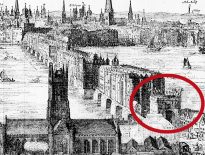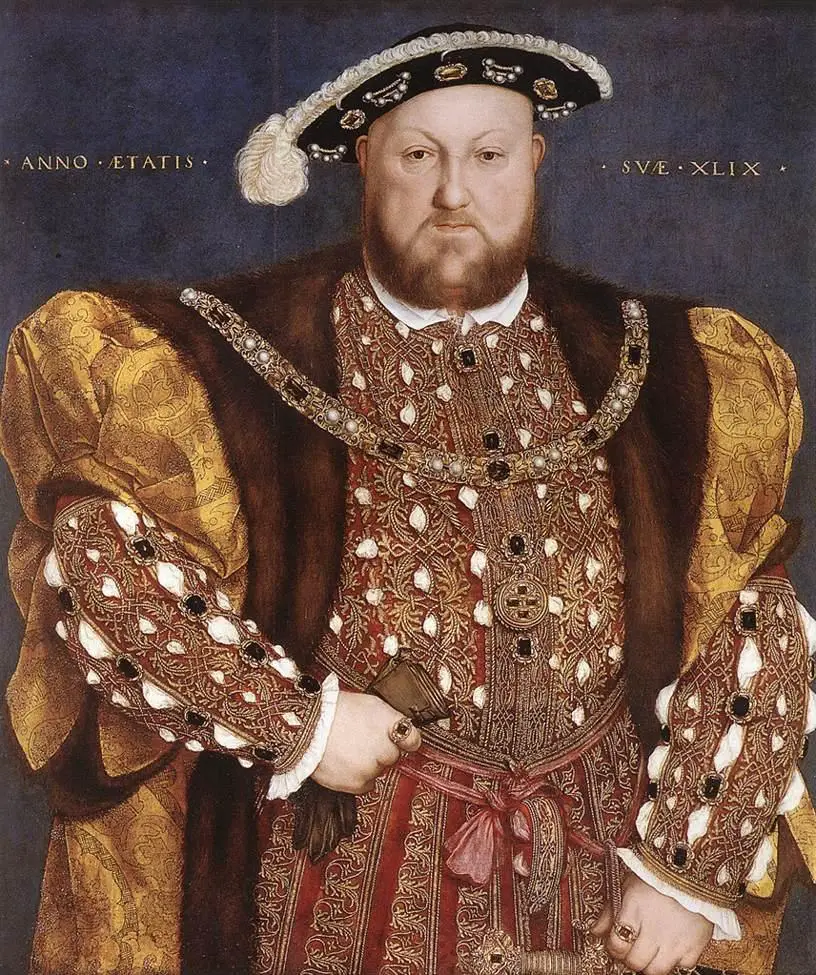As tomorrow is the anniversary of Thomas Cromwell's execution on 28th July 1540, I thought I'd examine the events leading up to his fall and consider why Henry VIII's right-hand man ended up on the scaffold.
You can read Cromwell's letter to Henry VIII at:
https://archive.org/stream/lifelettersoftho02merruoft#page/268
and
https://archive.org/stream/lifelettersoftho02merruoft#page/272
Notes and Sources
- Leithead, H. (2009, May 21). Cromwell, Thomas, earl of Essex (b. in or before 1485, d. 1540), royal minister. Oxford Dictionary of National Biography.
- Schofield, John (2008) The Rise and Fall of Thomas Cromwell: Henry VIII's Most Faithful Servant, The History Press.
- Merriman, Roger Bigelow (1902) Life and letters of Thomas Cromwell, Volume 2, Clarendon Press, p. 268-273, 273-276.
- 'Henry VIII: March 1541, 1-10', in Letters and Papers, Foreign and Domestic, Henry VIII, Volume 16, 1540-1541, ed. James Gairdner and R H Brodie (London, 1898), pp. 282-289. British History Online http://www.british-history.ac.uk/letters-papers-hen8/vol16/pp282-289



The Act of Attainder against Thomas Cromwell reads more like something from Shakespeare than a serious list of charges. For example, his claim that he would further the cause of the Reformation whether the King wanted to or not and “taking out his dagger” is meant to have boasted he would stand fighting in the street against anyone who opposed him. Oh, come on, people believed this? You couldn’t make it up, but obviously somebody did. His inability to satisfy Henry with the marriage to Anne of Cleves really left him open to his enemies who gathered to bring him down and he had made a few nobles angry. They looked down on him as a self made man. Oh wait a minute, this sounds familiar, yes, the same as with Thomas Wolsey. Everything else he had done was held against him, although he had done it all as the King’s servant. No doubt most things were his idea but it was all signed off on by Henry. He had let some people go when accused of stuff, but maybe he saw them as making an honest mistake. He was on the take over the monasteries, but with Henry’s blessing, but he wasn’t accused of that. He had pursued an aggressive religious policy against strong Catholic families and Anabaptist families, but he also did his duty and burned heretics. Henry gave him the power to do so. His relationship with the German Princes was no secret and had been part of his negotiations with Cleves and other states but he had also gone further in his political foreign aims, although Henry can’t have been totally ignorant. The accusations are almost ludicrous. Henry was easily persuaded against him, although he later regretted his death. Henry also kept him alive, using him to get an annulment from his fourth wife and then got rid of him. And Cromwell faced the humiliation of sharing the scaffold with an unsavoury character accused of vile and terrible crimes and he then faced a painful death as the executioner was brutal and clumsy and probably drunk.
Henry as always was off miles away, distracting himself. In this case he was getting married to a young Catholic noble woman, another niece of the Duke of Norfolk, the pretty and lively teenage, Kathryn Howard. She may have been as young as 15/16 but no older than 17/18 and Henry was 49. Now there was nothing wrong in this, although the average age for a woman to marry was 24,_because the noble and dynastic families did this for alliances and to get heirs and wealth. Childbirth was the single biggest killer of women in Tudor times and the sooner you got going the better your chances of having healthy children. Henry saw Kathryn as much of a chance for more sons as a young woman that he happened to find attractive, charming, lovely and was in love with. For Kathryn the attraction was clearly not looks, but wealth and power and Henry could still be quite charming and magnificent. In fact he could still give off splendour and charismatic illumination. Kathryn also had family duty and her family promoted the marriage, but she wasn’t forced into marriage. She had been courted by Henry and was content enough to be Queen. Unfortunately, despite her upbringing and her preparation to run a large household, Kathryn was not really suitable as Queen. She was charming, yes, she was generous yes, she had a good heart, yes, she was good at music and dancing, but she was also a spoilt brat who preferred play to acting as a Queen. She wasn’t a bimbo but she was young and she fell for the charms of a man call Thomas Culpepper, who may or may not have been her lover, the jury is out, and, unfortunately, because she already had a boyfriend, her past was used against the unfortunate young woman. Some scholars believe Kathryn may also have been abused or raped, but her relationship with Francis Dereham was with certainty consensual. She fell easily under the spell of others and left alone for a time, when Henry became ill or depressed, Kathryn found her own entertainment.
Great video Claire! I enjoyed it very much. I just have a few thoughts to add.
I believe Henry actually dwelled quite a bit over the decision to execute Cromwell. As history teaches us, Henry had Cromwell’s letter read aloud to him three times. Shortly before Henry signed the death warrant, Stephen Gardiner gave a passionate sermon at Saint Paul’s Cross, when he preached against those who believed salvation came through faith alone. I believe this is likely is what pushed Cromwell off the wrong side of the sword where Henry was concerned. It was just too much for Henry to look past.
Now in your video, you speak of Cromwell’s declaration that he died in the Catholic faith. Keep in mind, stating one is Catholic does not equate to being Roman Catholic. After all, Anglicans (a denomination that did not exist at the time) and Lutherans are also “Catholic”. When he referred to being Catholic, he meant “Holy Catholic and Apostolic Church”.
Instead, Cromwell quite clearly states his belief that salvation comes through one’s faith alone — not through good works. He said, “I see and acknowledge that there is in myself no hope of salvation, but all my confidence, hope and trust is in thy most merciful goodness. I have no merits or good works with I may allege before thee… Of sins and evil works, alas, I see a great heap… but through thy mercy, I trust to be in the number of them to whom thou wilt not impute their sins; but will take and accept me for righteous and just…”
So, in the end, it is my thought is that Henry signed the warrant because he believed Cromwell to be a heretic. And, quite frankly, in Henry’s view of religion, he was.
Just a quick reply as I’m out of the door. I didn’t dwell on Cromwell’s declaration that he died in the Catholic faith, I just quoted from him, as his speech is something I’ve gone into before in detail. The “Catholic” bit is something that Schofield goes into in detail on. He feels that Cromwell meant “catholic” with a small “c”, as the Anglicans use it, rather than, as you say, meaning Roman Catholic. It was a word that I used every week in church back in the UK as part of the creed in our Anglican church, so I know exactly what you mean.
Do you think that Cromwell was a sacramentarian? He denies it in his execution speech, and actually denies being a heretic in any way, but, as you say, Henry VIII would have seen his religious views as heresy.
Yes, I think Henry was pushed by Cromwell’s enemies into seeing Cromwell as a heretic, particularly as those he was linked to were heretics.
I believe Cromwell had sacramentarian sympathies because he was a friend and had been at University with the known Sacramentarian, John Lambert, who he allowed to burn, and some of his views were rather unorthodox. However, there were a lot of different “heresies” in England and even among people who questioned the Real Presence in the Eucharist there was disagreement as to what it exactly meant. It is very possible he was of this opinion but it is also something Cromwell kept to himself. His views would reflect I think more the Anglican creed than the Roman Catholic creed. At the time I believe what was orthodox and what was considered heresy was not yet written in stone, if indeed they ever were, and there was still much confusion, cross over and variety.